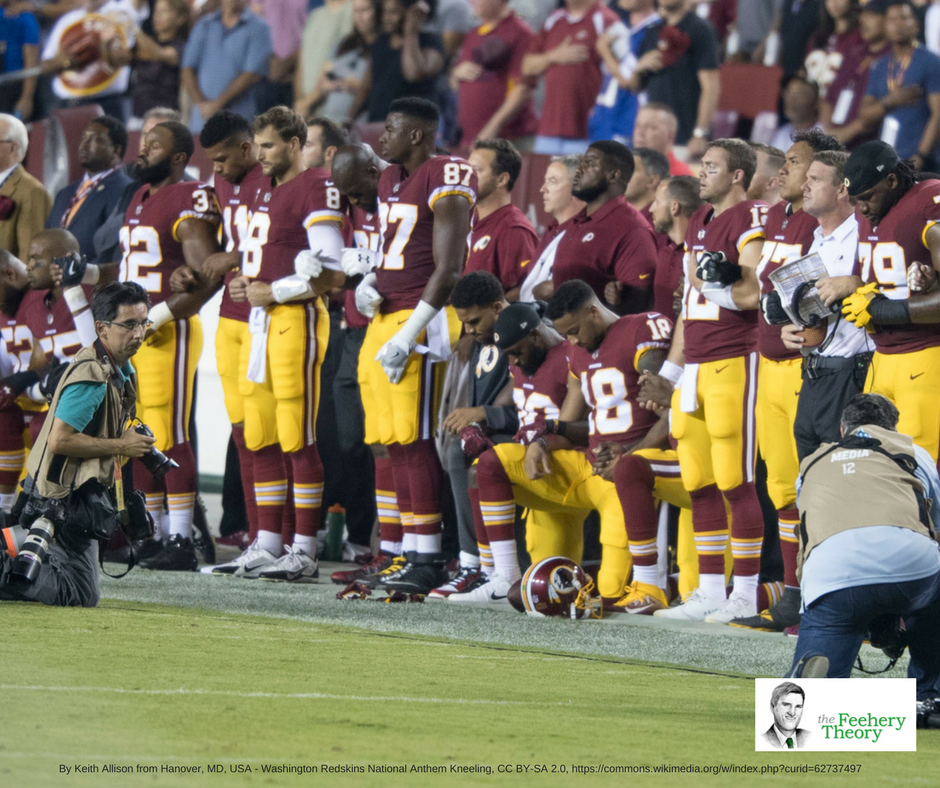National Anthem Protest: An Unhelpful Controversy
Posted on September 26, 2017

On the National Anthem protest...
Singing the national anthem at sporting events started in 1918, as a marketing ploy, even before we had a national anthem.
It was during the seventh-inning stretch in the World Series that pitted the Chicago Cubs vs. the Boston Red Sox when the organist first played the “Star-Spangled Banner. “
This was 13 years before that song was officially designated as our national anthem.
Owners and players were feeling a little bit sheepish about America’s entry into the Great War. Many questioned why the games were being played at all, and more than a few wondered why the players themselves were not serving “over there.”
The owner of the Red Sox, inspired by what he saw in Chicago, decided to open every home game after that with America’s most patriotic song.
Politics and sports have thus always been intertwined.
Today, the Department of Defense actually pays sporting franchises to do patriotic things during the games, including playing “God Bless America” and saluting our troops.
I’m not sure how I feel about my tax dollars going to this type of propaganda. To be honest with you, I’m not all that excited about it.
It wasn’t until after 9/11 that professional football teams routinely came on to the field to listen to the national anthem. They usually stayed in the locker rooms to get last-minute instructions or get pumped up for the battering that was about to take place.
President Trump stirred up an already-stirred-up hornet’s nest when he gave his opinion of those players who choose to disrespect the flag by refusing to stand while the “Star-Spangled Banner” is being played.
I would venture to say that his sentiments, before being uttered by him, were widely shared by most paying customers in the stands at the average NFL game.
I am always astounded by the folks who go to NFL games. These are not cheap tickets. The most loyal customers are, for the most part, working-class people who have to pay a significant percentage of their yearly income for the privilege of directly supporting the National Football League.
They don’t come to hear about politics. They come to forget their troubles, have a few beers — OK, more than a few — and see some huge men beat each other silly on gridiron.
And that is the inherent danger that is now faced by the owners. The fans don’t want politics shoved in their faces when they go to football games on Sundays.
Sports should be the great integrator of American society. And outside of the military, since Jackie Robinson first broke the color barrier, professional and college sports have done much to make America a more color-blind place.
But sports fans love athletes for their athletic prowess, not for their political views. Michael Jordan once famously said that Republicans buy sneakers, too, as a way to justify his comparative silence in the political realm.
As a political junkie, I’m not afraid of having a conversation about race, politics and sports.
Here is my view. Colin Kaepernick has an absolute right to express his opinions about the state of American race relations, but he as does so, he must understand the potential impact on his career. Trump has an equal right to express his counter-opinion, but he, too, should understand that comes at a potential cost to his reputation.
The National Anthem protest creates controversy, but I don’t think it creates a better understanding. Share on X
As a society, we need to discuss what is happening in our most broken communities and find a way to fix those communities. It would be better to do that in a respectful and dignified way. The Kaepernick approach works as a way to create controversy, but I don’t think it works to create better understanding. It polarizes without unifying. Ditto for the president’s comments.
One other point: Sports, especially football and basketball, shouldn’t be the only ticket out of the ghetto. The chances of a kid making it to the NFL or the NBA are about equal to winning the lottery. So, as we seek to rebuild broken communities, we need to give people more opportunities to succeed outside the sports world.
Published in The Hill.
